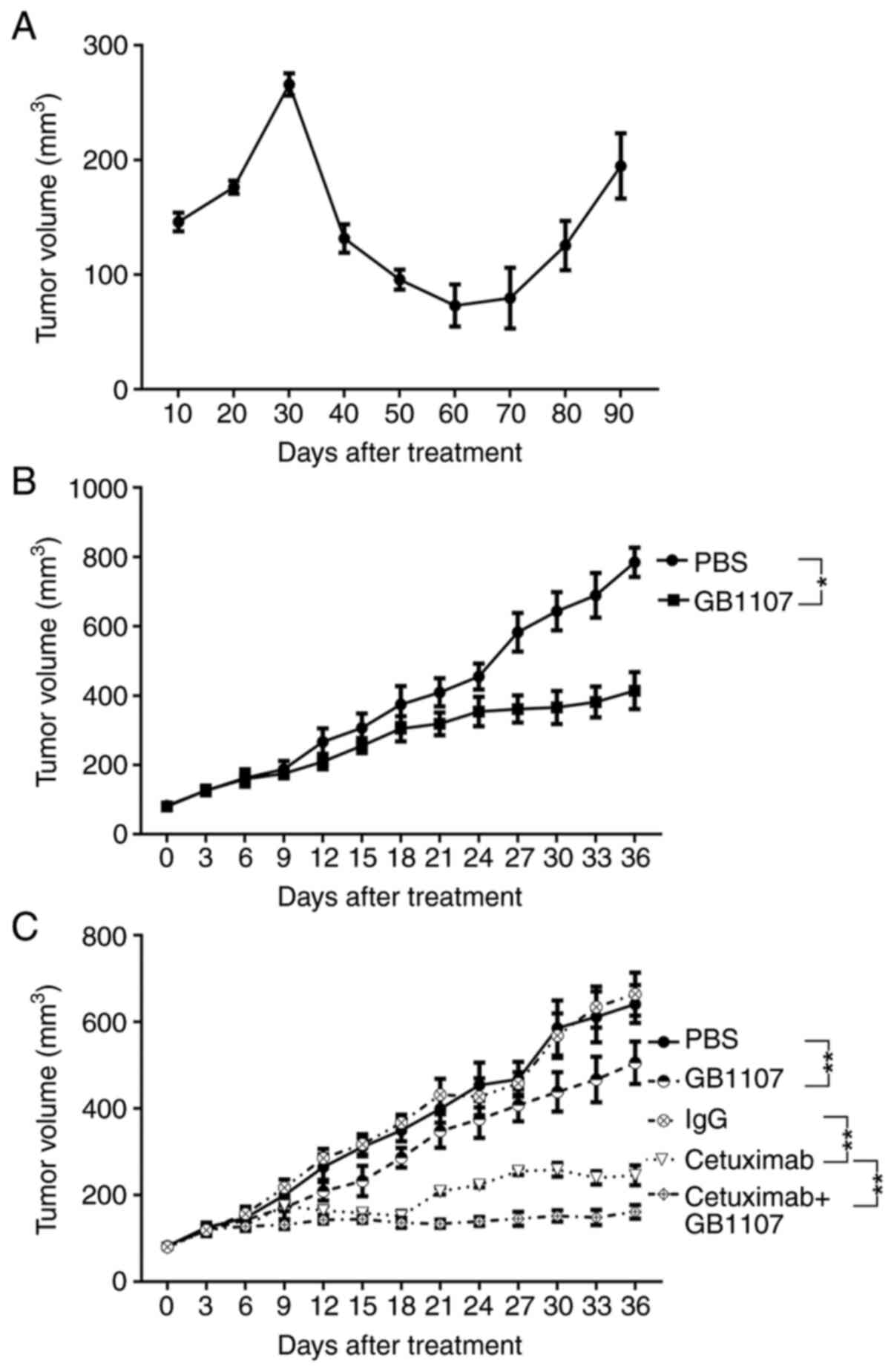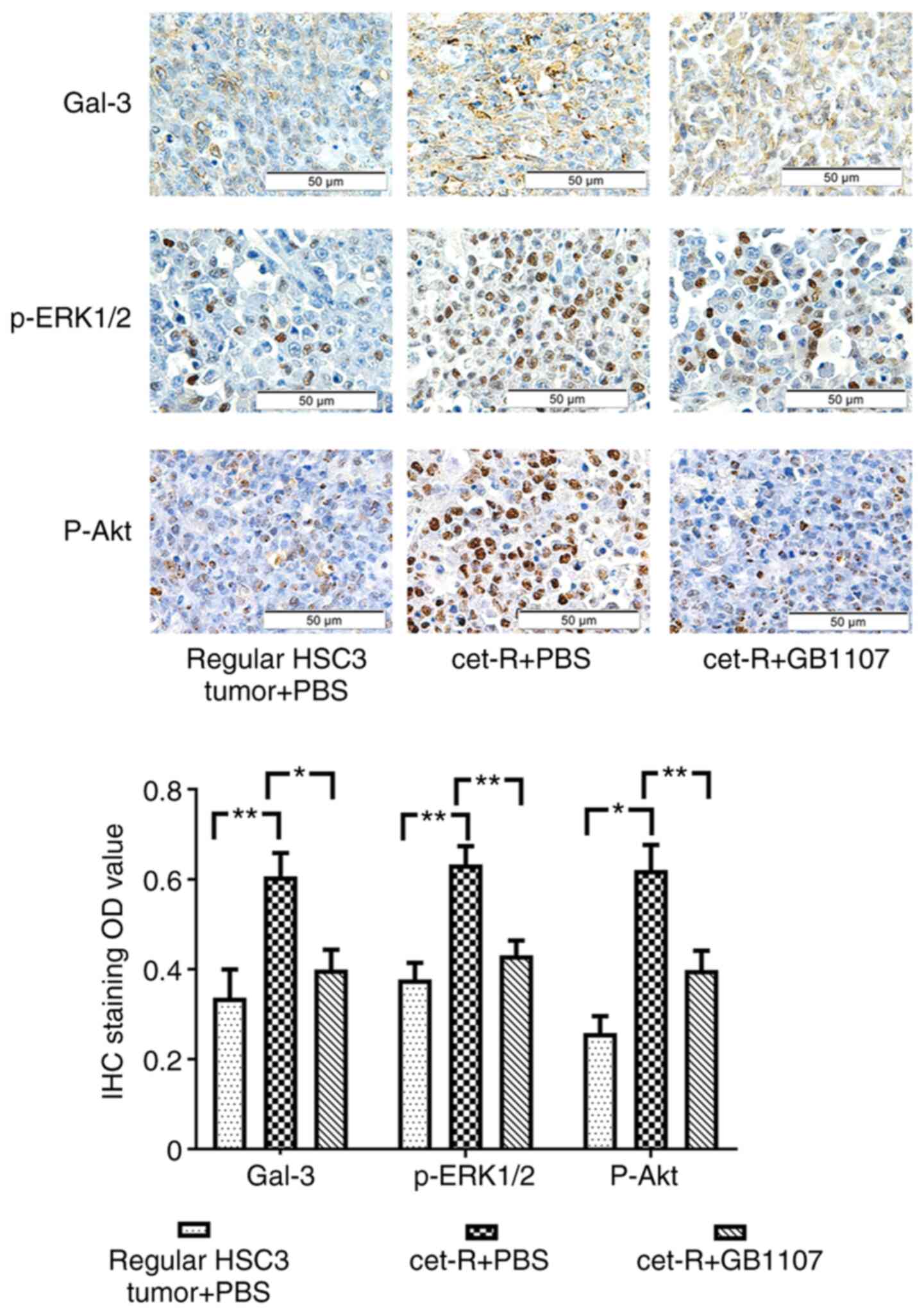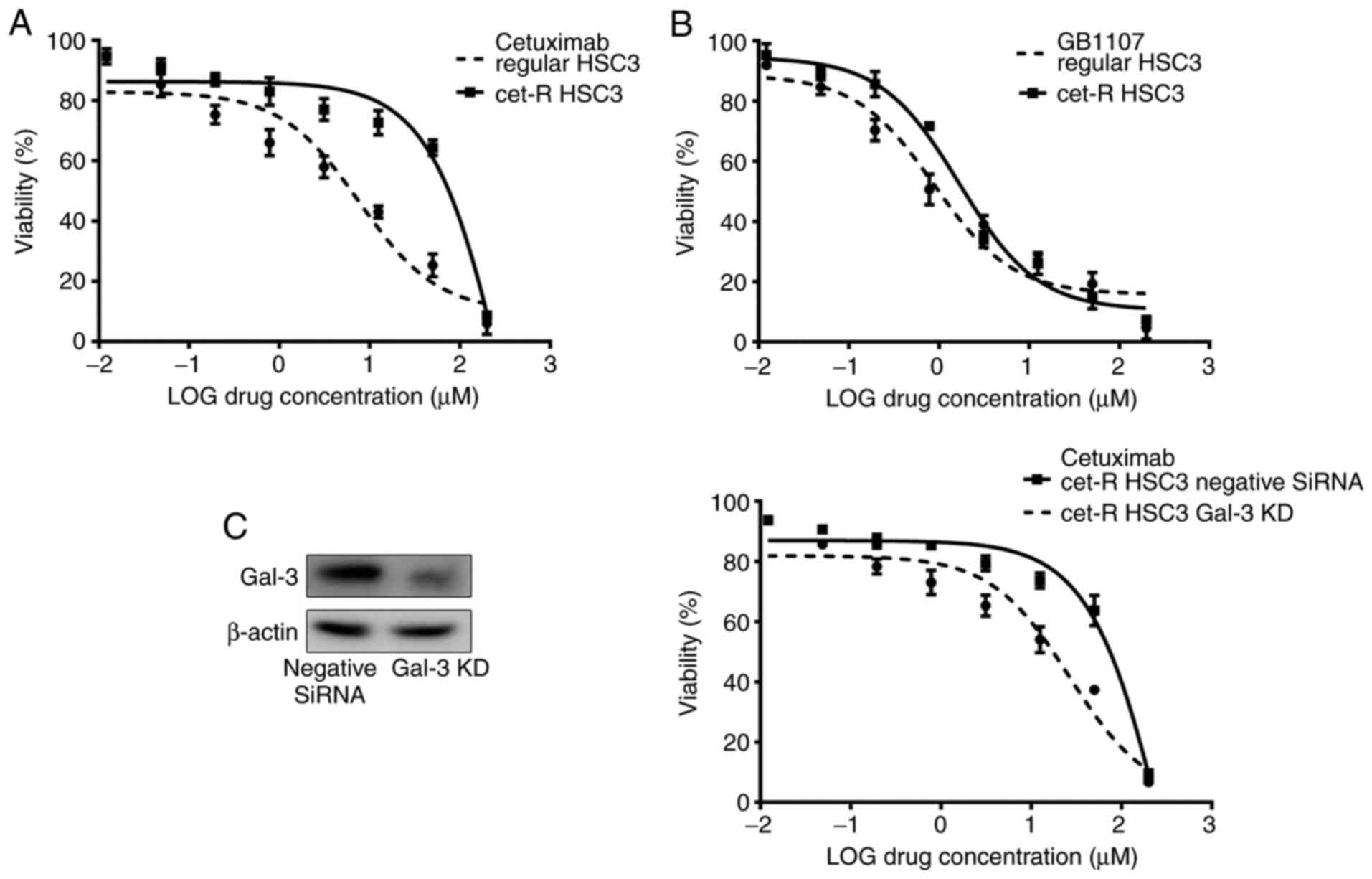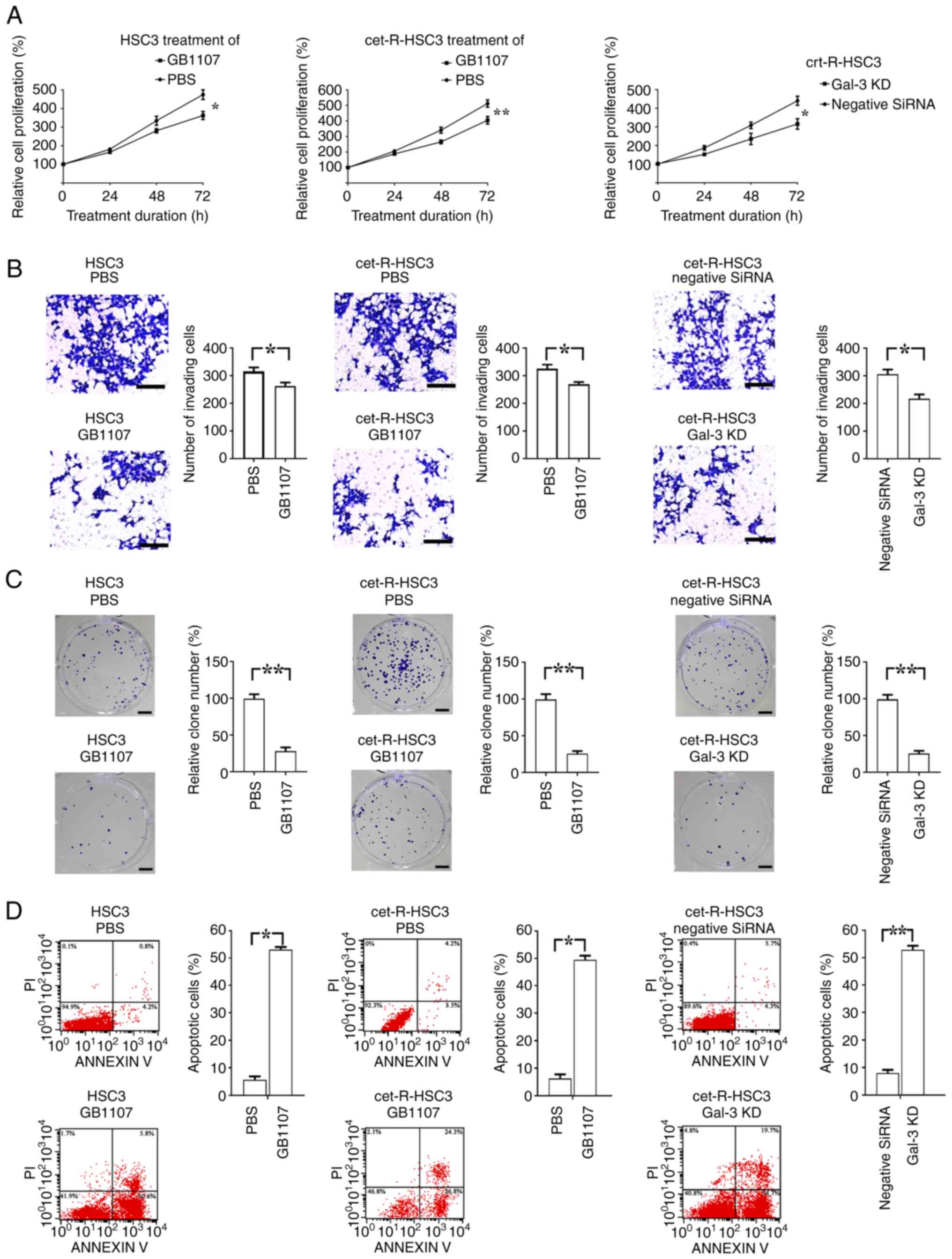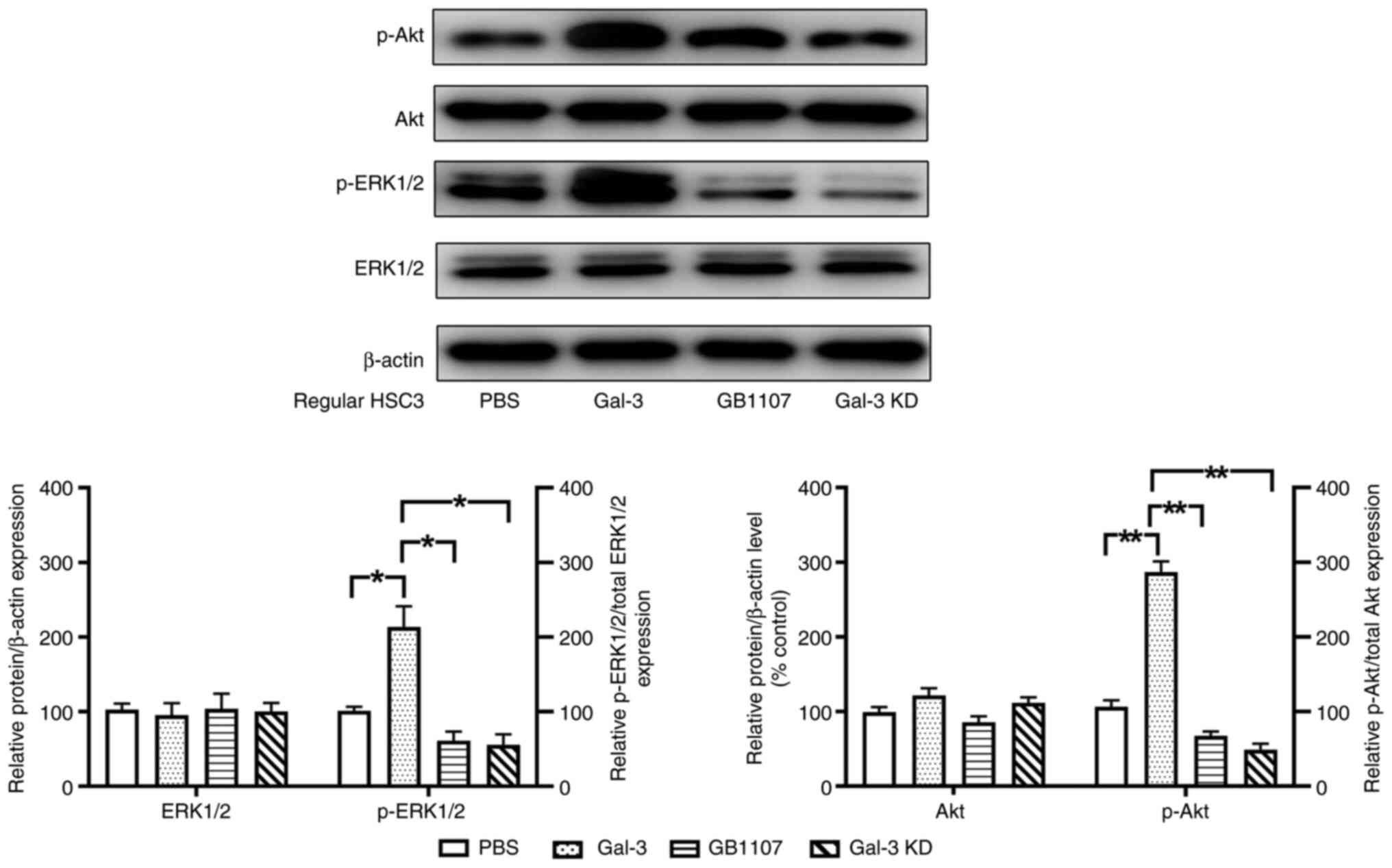|
1
|
Cancer IAfRo: Global Cancer Observatory
Available from. http://www-dep.iarc.fr/2007.
|
|
2
|
Muzaffar J, Bari S, Kirtane K and Chung
CH: Recent advances and future directions in clinical management of
head and neck squamous cell carcinoma. Cancers (Basel). 13:3382021.
View Article : Google Scholar : PubMed/NCBI
|
|
3
|
Prawira A, Brana-Garcia I, Spreafico A,
Hope A, Waldron J, Razak AR, Chen EX, Jang R, O'Sullivan B,
Giuliani M, et al: Phase I trial of dacomitinib, a pan-human
epidermal growth factor receptor (HER) inhibitor, with concurrent
radiotherapy and cisplatin in patients with locoregionally advanced
squamous cell carcinoma of the head and neck (XDC-001). Invest New
Drugs. 34:575–583. 2016. View Article : Google Scholar : PubMed/NCBI
|
|
4
|
Yamaoka T, Ohba M and Ohmori T:
Molecular-targeted therapies for epidermal growth factor receptor
and its resistance mechanisms. Int J Mol Sci. 18:24202017.
View Article : Google Scholar : PubMed/NCBI
|
|
5
|
Saba NF, Chen ZG, Haigentz M, Bossi P,
Rinaldo A, Rodrigo JP, Mäkitie AA, Takes RP, Strojan P, Vermorken
JB and Ferlito A: Targeting the EGFR and immune pathways in
squamous cell carcinoma of the head and neck (SCCHN): Forging a new
alliance. Mol Cancer Ther. 18:1909–1915. 2019. View Article : Google Scholar : PubMed/NCBI
|
|
6
|
Campbell NP, Hensing TA, Bhayani MK,
Shaikh AY and Brockstein BE: Targeting pathways mediating
resistance to anti-EGFR therapy in squamous cell carcinoma of the
head and neck. Expert Rev Anticancer Ther. 16:847–858. 2016.
View Article : Google Scholar : PubMed/NCBI
|
|
7
|
Vigneswaran N and Williams MD:
Epidemiologic trends in head and neck cancer and aids in diagnosis.
Oral Maxillofac Surg Clin North Am. 26:123–141. 2014. View Article : Google Scholar : PubMed/NCBI
|
|
8
|
Ohnishi Y, Yasui H, Kakudo K and Nozaki M:
Cetuximab-resistant oral squamous cell carcinoma cells become
sensitive in anchorage-independent culture conditions through the
activation of the EGFR/AKT pathway. Int J Oncol. 47:2165–2172.
2015. View Article : Google Scholar : PubMed/NCBI
|
|
9
|
Rong C, Muller MF, Xiang F, Jensen A,
Weichert W, Major G, Plinkert PK, Hess J and Affolter A: Adaptive
ERK signalling activation in response to therapy and in silico
prognostic evaluation of EGFR-MAPK in HNSCC. Br J Cancer.
123:288–297. 2020. View Article : Google Scholar : PubMed/NCBI
|
|
10
|
Modenutti CP, Capurro JIB, Di Lella S and
Marti MA: The structural biology of galectin-ligand recognition:
Current advances in modeling tools, protein engineering, and
inhibitor design. Front Chem. 7:8232019. View Article : Google Scholar : PubMed/NCBI
|
|
11
|
Sciacchitano S, Lavra L, Morgante A,
Ulivieri A, Magi F, De Francesco GP, Bellotti C, Salehi LB and
Ricci A: Galectin-3: One molecule for an alphabet of diseases, from
A to Z. Int J Mol Sci. 19:3792018. View Article : Google Scholar : PubMed/NCBI
|
|
12
|
Nangia-Makker P, Hogan V and Raz A:
Galectin-3 and cancer stemness. Glycobiology. 28:172–181. 2018.
View Article : Google Scholar : PubMed/NCBI
|
|
13
|
Diaz-Alvarez L and Ortega E: The many
roles of galectin-3, a multifaceted molecule, in innate immune
responses against pathogens. Mediators Inflamm. 2017:92475742017.
View Article : Google Scholar : PubMed/NCBI
|
|
14
|
Mirandola L, Yu Y, Cannon MJ, Jenkins MR,
Rahman RL, Nguyen DD, Grizzi F, Cobos E, Figueroa JA and
Chiriva-Internati M: Galectin-3 inhibition suppresses drug
resistance, motility, invasion and angiogenic potential in ovarian
cancer. Gynecol Oncol. 135:573–579. 2014. View Article : Google Scholar : PubMed/NCBI
|
|
15
|
Fukumori T, Kanayama HO and Raz A: The
role of galectin-3 in cancer drug resistance. Drug Resist Updat.
10:101–108. 2007. View Article : Google Scholar : PubMed/NCBI
|
|
16
|
Dondoo TO, Fukumori T, Daizumoto K, Fukawa
T, Kohzuki M, Kowada M, Kusuhara Y, Mori H, Nakatsuji H, Takahashi
M and Kanayama HO: Galectin-3 is implicated in tumor progression
and resistance to anti-androgen drug through regulation of androgen
receptor signaling in prostate cancer. Anticancer Res. 37:125–134.
2017. View Article : Google Scholar : PubMed/NCBI
|
|
17
|
Weber M, Buttner-Herold M, Distel L, Ries
J, Moebius P, Preidl R, Geppert CI, Neukam FW and Wehrhan F:
Galectin 3 expression in primary oral squamous cell carcinomas. BMC
Cancer. 17:9062017. View Article : Google Scholar : PubMed/NCBI
|
|
18
|
Wang LP, Chen SW, Zhuang SM, Li H and Song
M: Galectin-3 accelerates the progression of oral tongue squamous
cell carcinoma via a Wnt/β-catenin-dependent pathway. Pathol Oncol
Res. 19:461–474. 2013. View Article : Google Scholar : PubMed/NCBI
|
|
19
|
Zhang D, Chen ZG, Liu SH, Dong ZQ, Dalin
M, Bao SS, Hu YW and Wei FC: Galectin-3 gene silencing inhibits
migration and invasion of human tongue cancer cells in vitro via
downregulating β-catenin. Acta Pharmacol Sin. 34:176–184. 2013.
View Article : Google Scholar : PubMed/NCBI
|
|
20
|
Ruvolo PP: Galectin 3 as a guardian of the
tumor microenvironment. Biochim Biophys Acta. 1863:427–437. 2016.
View Article : Google Scholar : PubMed/NCBI
|
|
21
|
Kilkenny C, Browne W, Cuthill IC, Emerson
M and Altman DG; NC3Rs Reporting Guidelines Working Group, : Animal
research: Reporting in vivo experiments: The ARRIVE guidelines. Br
J Pharmacol. 160:1577–1579. 2010. View Article : Google Scholar : PubMed/NCBI
|
|
22
|
Yin J, Jung JE, Choi SI, Kim SS, Oh YT,
Kim TH, Choi E, Lee SJ, Kim H, Kim EO, et al: Inhibition of BMP
signaling overcomes acquired resistance to cetuximab in oral
squamous cell carcinomas. Cancer Lett. 414:181–189. 2018.
View Article : Google Scholar : PubMed/NCBI
|
|
23
|
Zhang H, Liu P, Zhang Y, Han L, Hu Z, Cai
Z and Cai J: Inhibition of galectin-3 augments the antitumor
efficacy of PD-L1 blockade in non-small-cell lung cancer. FEBS Open
Bio. 11:911–920. 2021. View Article : Google Scholar : PubMed/NCBI
|
|
24
|
Al Kafri N and Hafizi S: Galectin-3
stimulates tyro3 receptor tyrosine kinase and erk signalling, cell
survival and migration in human cancer cells. Biomolecules.
10:10352020. View Article : Google Scholar : PubMed/NCBI
|
|
25
|
Seyed Jafari SM and Hunger RE: IHC optical
density score: A new practical method for quantitative
immunohistochemistry image analysis. Appl Immunohistochem Mol
Morphol. 25:e12–e13. 2017. View Article : Google Scholar : PubMed/NCBI
|
|
26
|
Barbe AM, Berbets AM, Davydenko IS, Koval
HD, Yuzko VO and Yuzko OM: Expression and significance of matrix
metalloproteinase-2 and matrix metalloproteinas-9 in endometriosis.
J Med Life. 13:314–320. 2020.PubMed/NCBI
|
|
27
|
Yu F, Finley RL Jr, Raz A and Kim HR:
Galectin-3 translocates to the perinuclear membranes and inhibits
cytochrome c release from the mitochondria. A role for synexin in
galectin-3 translocation. J Biol Chem. 277:15819–15827. 2002.
View Article : Google Scholar : PubMed/NCBI
|
|
28
|
Li M, Chen YB, Liu F, Qu JQ, Ren LC, Chai
J and Tang CE: Galectin3 facilitates the proliferation and
migration of nasopharyngeal carcinoma cells via activation of the
ERK1/2 and Akt signaling pathways, and is positively correlated
with the inflammatory state of nasopharyngeal carcinoma. Mol Med
Rep. 23:3702021. View Article : Google Scholar : PubMed/NCBI
|
|
29
|
Al-Salam S, Hashmi S, Jagadeesh GS and
Tariq S: Galectin-3: A cardiomyocyte antiapoptotic mediator at
24-hour post myocardial infarction. Cell Physiol Biochem.
54:287–302. 2020. View Article : Google Scholar : PubMed/NCBI
|
|
30
|
Grandis JR and Tweardy DJ: Elevated levels
of transforming growth factor alpha and epidermal growth factor
receptor messenger RNA are early markers of carcinogenesis in head
and neck cancer. Cancer Res. 53:3579–3584. 1993.PubMed/NCBI
|
|
31
|
Bei R, Budillon A, Masuelli L, Cereda V,
Vitolo D, Di Gennaro E, Ripavecchia V, Palumbo C, Ionna F, Losito
S, et al: Frequent overexpression of multiple ErbB receptors by
head and neck squamous cell carcinoma contrasts with rare antibody
immunity in patients. J Pathol. 204:317–325. 2004. View Article : Google Scholar : PubMed/NCBI
|
|
32
|
Normanno N, De Luca A, Bianco C, Strizzi
L, Mancino M, Maiello MR, Carotenuto A, De Feo G, Caponigro F and
Salomon DS: Epidermal growth factor receptor (EGFR) signaling in
cancer. Gene. 366:2–16. 2006. View Article : Google Scholar : PubMed/NCBI
|
|
33
|
Ang KK, Berkey BA, Tu X, Zhang HZ, Katz R,
Hammond EH, Fu KK and Milas L: Impact of epidermal growth factor
receptor expression on survival and pattern of relapse in patients
with advanced head and neck carcinoma. Cancer Res. 62:7350–7356.
2002.PubMed/NCBI
|
|
34
|
Tao Y, Auperin A, Sun X, Sire C, Martin L,
Coutte A, Lafond C, Miroir J, Liem X, Rolland F, et al:
Avelumab-cetuximab-radiotherapy versus standards of care in locally
advanced squamous-cell carcinoma of the head and neck: The safety
phase of a randomised phase III trial GORTEC 2017-01 (REACH). Eur J
Cancer. 141:21–29. 2020. View Article : Google Scholar : PubMed/NCBI
|
|
35
|
Merlano MC, Denaro N, Vecchio S, Licitra
L, Curcio P, Benasso M, Bagicalupo A, Numico G, Russi E, Corvo' R,
et al: Phase III randomized study of induction chemotherapy
followed by definitive radiotherapy + cetuximab versus
chemoradiotherapy in squamous cell carcinoma of head and neck: The
INTERCEPTOR-GONO Study (NCT00999700). Oncology. 98:763–770. 2020.
View Article : Google Scholar : PubMed/NCBI
|
|
36
|
Gebre-Medhin M, Brun E, Engstrom P, Haugen
Cange H, Hammarstedt-Nordenvall L, Reizenstein J, Nyman J, Abel E,
Friesland S, Sjödin H, et al: ARTSCAN III: A randomized phase iii
study comparing chemoradiotherapy with cisplatin versus cetuximab
in patients with locoregionally advanced head and neck squamous
cell cancer. J Clin Oncol. 39:38–47. 2021. View Article : Google Scholar : PubMed/NCBI
|
|
37
|
Bonner JA, Harari PM, Giralt J, Azarnia N,
Shin DM, Cohen RB, Jones CU, Sur R, Raben D, Jassem J, et al:
Radiotherapy plus cetuximab for squamous-cell carcinoma of the head
and neck. N Engl J Med. 354:567–578. 2006. View Article : Google Scholar : PubMed/NCBI
|
|
38
|
Vermorken JB, Trigo J, Hitt R, Koralewski
P, Diaz-Rubio E, Rolland F, Knecht R, Amellal N, Schueler A and
Baselga J: Open-label, uncontrolled, multicenter phase II study to
evaluate the efficacy and toxicity of cetuximab as a single agent
in patients with recurrent and/or metastatic squamous cell
carcinoma of the head and neck who failed to respond to
platinum-based therapy. J Clin Oncol. 25:2171–2177. 2007.
View Article : Google Scholar : PubMed/NCBI
|
|
39
|
Bray SM, Lee J, Kim ST, Hur JY, Ebert PJ,
Calley JN, Wulur IH, Gopalappa T, Wong SS, Qian HR, et al: Genomic
characterization of intrinsic and acquired resistance to cetuximab
in colorectal cancer patients. Sci Rep. 9:153652019. View Article : Google Scholar : PubMed/NCBI
|
|
40
|
Yonesaka K, Zejnullahu K, Okamoto I, Satoh
T, Cappuzzo F, Souglakos J, Ercan D, Rogers A, Roncalli M, Takeda
M, et al: Activation of ERBB2 signaling causes resistance to the
EGFR-directed therapeutic antibody cetuximab. Sci Transl Med.
3:99ra862011. View Article : Google Scholar : PubMed/NCBI
|
|
41
|
Napolitano S, Martini G, Rinaldi B,
Martinelli E, Donniacuo M, Berrino L, Vitagliano D, Morgillo F,
Barra G, De Palma R, et al: Primary and acquired resistance of
colorectal cancer to anti-EGFR monoclonal antibody can be overcome
by combined treatment of regorafenib with cetuximab. Clin Cancer
Res. 21:2975–2983. 2015. View Article : Google Scholar : PubMed/NCBI
|
|
42
|
Ercan D, Xu C, Yanagita M, Monast CS,
Pratilas CA, Montero J, Butaney M, Shimamura T, Sholl L, Ivanova
EV, et al: Reactivation of ERK signaling causes resistance to EGFR
kinase inhibitors. Cancer Discov. 2:934–947. 2012. View Article : Google Scholar : PubMed/NCBI
|
|
43
|
Li Y, Zang H, Qian G, Owonikoko TK,
Ramalingam SR and Sun SY: ERK inhibition effectively overcomes
acquired resistance of epidermal growth factor receptor-mutant
non-small cell lung cancer cells to osimertinib. Cancer.
126:1339–1350. 2020. View Article : Google Scholar : PubMed/NCBI
|
|
44
|
Liu X, Chen X, Shi L, Shan Q, Cao Q, Yue
C, Li H, Li S, Wang J, Gao S, et al: The third-generation EGFR
inhibitor AZD9291 overcomes primary resistance by continuously
blocking ERK signaling in glioblastoma. J Exp Clin Cancer Res.
38:2192019. View Article : Google Scholar : PubMed/NCBI
|
|
45
|
Gao L, Xu J, He G, Huang J, Xu W, Qin J,
Zheng P, Ji M, Chang W, Ren L, et al: CCR7 high expression leads to
cetuximab resistance by cross-talking with EGFR pathway in PI3K/AKT
signals in colorectal cancer. Am J Cancer Res. 9:2531–2543.
2019.PubMed/NCBI
|
|
46
|
Han Y, Peng Y, Fu Y, Cai C, Guo C, Liu S,
Li Y, Chen Y, Shen E, Long K, et al: MLH1 deficiency induces
cetuximab resistance in colon cancer via Her-2/PI3K/AKT signaling.
Adv Sci (Weinh). 7:20001122020. View Article : Google Scholar : PubMed/NCBI
|
|
47
|
Rebucci M, Peixoto P, Dewitte A, Wattez N,
De Nuncques MA, Rezvoy N, Vautravers-Dewas C, Buisine MP, Guerin E,
Peyrat JP, et al: Mechanisms underlying resistance to cetuximab in
the HNSCC cell line: Role of AKT inhibition in bypassing this
resistance. Int J Oncol. 38:189–200. 2011.PubMed/NCBI
|
|
48
|
Song L, Tang JW, Owusu L, Sun MZ, Wu J and
Zhang J: Galectin-3 in cancer. Clin Chim Acta. 431:185–191. 2014.
View Article : Google Scholar : PubMed/NCBI
|
|
49
|
Vuong L, Kouverianou E, Rooney CM, McHugh
BJ, Howie SEM, Gregory CD, Forbes SJ, Henderson NC, Zetterberg FR,
Nilsson UJ, et al: An orally active galectin-3 antagonist inhibits
lung adenocarcinoma growth and augments response to PD-L1 Blockade.
Cancer Res. 79:1480–1492. 2019. View Article : Google Scholar : PubMed/NCBI
|
|
50
|
Nakahara S, Oka N and Raz A: On the role
of galectin-3 in cancer apoptosis. Apoptosis. 10:267–275. 2005.
View Article : Google Scholar : PubMed/NCBI
|
|
51
|
Yang RY, Hill PN, Hsu DK and Liu FT: Role
of the carboxyl-terminal lectin domain in self-association of
galectin-3. Biochemistry. 37:4086–4092. 1998. View Article : Google Scholar : PubMed/NCBI
|
|
52
|
Kim SJ and Chun KH: Non-classical role of
Galectin-3 in cancer progression: Translocation to nucleus by
carbohydrate-recognition independent manner. BMB Rep. 53:173–180.
2020. View Article : Google Scholar : PubMed/NCBI
|















